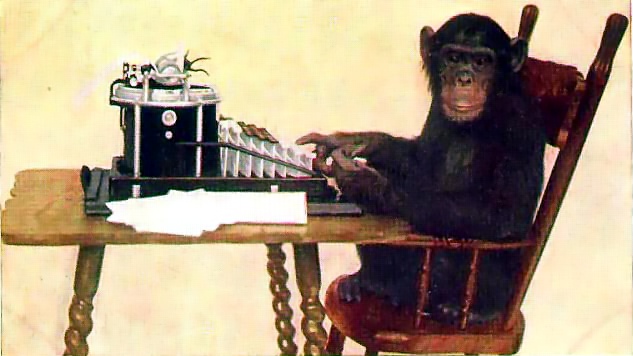 |
| Next, I think I'll write Hamlet. |
Apparently there is a big scandal going on in the academic word, involving a paper published in a minor scientific journal, PLOS One. The problem is that the paper, by three Chinese and one American scientists, refers to the Creator as the reason for the remarkable abilities of the human hand.
The comments were pretty scathing. One, a fellow editor with the same journal, wrote “The article should be retracted and the handling editor should be dismissed.” An Associate professor at Duke wrote: “This is outrageous. If PLOS ONE does not do something about it, i.e., ask the authors to retract the paper, and in any case, if the paper isn't retracted, my students, collaborators and I will have no choice but to refrain from considering (i..e, reading, reviewing and citing) papers published in PLOS ONE.” Another reader writes “I find the use of religious language in a scietific [sic] paper totally unacceptable.” The authors have backed down, claiming it was all a problem in translation, that they meant to say not “Creator” but “Nature.” Nevertheless, the scandal was such that the paper has since been retracted by the journal. And the authors have not been allowed the chance to resubmit the paper in any amended form.
The journal's retraction notice reads, in part:
“... [T]he PLOS ONE editors ... apologize to readers for the inappropriate language in the article and the errors during the evaluation process.”To a reader comment, they responded: “A number of readers have concerns about sentences in the article that make references to a 'Creator'. The PLOS ONE editors apologize that this language was not addressed internally or by the Academic Editor during the evaluation of the manuscript.”
For a time, the paper was pulled from the website. Now they have put it back up, without their imprimatur, no doubt by popular demand. They are clearly scrambling, and things are changing minute by minute.
Something is very wrong here. Anyone who is religious believes, as a matter of logical necessity, that the human hand was designed by God. Moreover, the argument from design is a time-honoured means of proving God's existence. The reaction of the scientific community and the journal seems to imply that this sort of statement, regardless of the evidence, is not permitted. This is simple religious discrimination, at the expense not just of religion but of science, which ought to be an open inquiry.
The authors' explanation that they meant “Nature” is bogus. The conclusion makes it clear that they are referring to an entity separate from and guiding natural selection: “the proper design by the Creator for dexterous performance of numerous functions following the evolutionary remodeling of the ancestral hand for millions of years.” The authors' response to one of the first comments objecting to the paper also made this clear. Interestingly, this comment seems to have been deleted. It essentially used the “watchmaker” analogy, pointing out that no human device has yet matched the dexterity of the human hand.
In any case, changing “Creator” to “Nature” does not change anything substantial. If you are going to attribute a design and a will to “Nature,” “Nature” is simply the word you use for God. Interestingly, almost everyone who speaks of the biological sphere without using the term “God” in fact does this. When we speak of evolution moving from simple to complex, or to greater consciousness, or of “the balance of nature,” we are assuming a deity and a design. It is almost impossible not to. The only difference is that if you use the term “Nature,” (or “Earth,” or “Gaea,” or “science”), you are appealing to a pagan formulation of God. You are, specifically, excluding Christ and the concept of redemption. And as an article of faith.
Some argue that the Creator has no part in a scientific argument because God's existence is not itself a matter that is scientifically testable. But it is—the point of the reference in the present article is precisely that the evidence weighs in favour of the existence of God. Moreover, elements of the opposing Darwinian theory are genuinely untestable. How do you demonstrate that something (e.g., “random mutation”) is truly “random.”
 |
| William of Okham (i.e., Occam) |
Of course, the answer is that neither Darwin nor Wallace meant “random” to be taken in this sense, in the sense that modern anti-religious bigotry seems to take it. They meant, specifically, random with regard to the survival value of the mutation. They did not mean that there was no larger or divine design involved. Wallace expressly believed that there was.
Intelligent design really ought to be a no-brainer. Is a giraffe, say, plausibly, a random collection of molecules? Would Occam accept that shave?
Intelligent design really ought to be a no-brainer. Is a giraffe, say, plausibly, a random collection of molecules? Would Occam accept that shave?













No comments:
Post a Comment